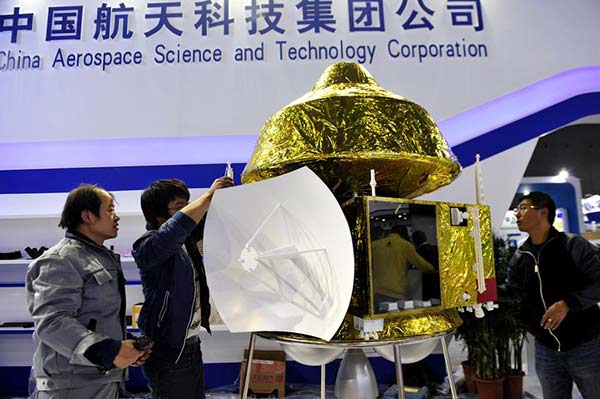 |
|
The golden-color spacecraft developed by China Aerospace Science and Technology Corporation makes its debut on Nov 2, 2015. [Photo/Xinhua] |
The golden-color spacecraft developed by China Aerospace Science and Technology Corporation made its debut on Monday, Xinhua News Agency reported.
China's Mars exploration project will include a surface landing and a comprehensive remote sensing while orbiting the planet, said Niu Shengda, a satellite expert with the Shanghai Academy of Spaceflight Technology.
China plans to conduct the Mars mission around 2020, the news report said.
Related: China aims to go deeper into space
By Xinhua
BEIJING - As China's exploration of the moon progresses, its space experts have begun considering going deeper into the solar system - to Mars, asteroids and Jupiter - and a manned deep-space mission.
At a recent conference on deep-space exploration in Harbin, capital of northeast China's Heilongjiang Province, an official urged scientists and technologists to have a pioneering spirit.
"When exploring the unknown, we should not just follow others. China should be more creative," said Liu Jizhong, director of the lunar exploration program and space engineering center under the State Administration of Science, Technology and Industry for National Defense.
He pointed out that China still needs to tackle key problems, such as how to go into deep space at higher speeds; generating energy and power; and developing space robots that can work in the complicated space environment.
China should also strengthen international cooperation. "Exploring space is a great undertaking for the whole of humankind, and China should shoulder its responsibilities as a big country. Through international cooperation, we can learn from each other and jointly contribute," Liu said.
FAR SIDE OF THE MOON
Some Chinese scientists have suggested landing a probe on the far side of the moon, which would be unprecedented. Although China has not officially announced the plan, experts have begun to prepare the technologies needed.
Zhang Lihua, a researcher with China Spacesat Co., Ltd., said exploring the far side of the moon is of great scientific importance. Many countries have designed their own plans for such a mission.
It would require a relay satellite, which would be used for communication and navigation on the L2- or Lagrange point where the satellite could orbit within the combined gravitational pull of the Earth-moon system, said Zhang.
Lin Yilu, a senior engineer of the Shanghai Aerospace Systems Engineering Institute, said developing a lunar relay satellite is necessary for future lunar exploration, sending astronauts to the moon, as well as setting up a lunar base.
"If China expands the range of its lunar exploration, such as exploring the south and north poles and the far side of the moon, it needs a constellation of satellites covering different areas of the moon's surface," said Lin.
